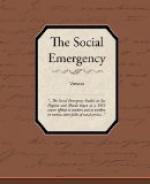Then there are the legal phases of the situation. We must consider, on the one hand how much can be accomplished by legislation, in view of all the known factors in the situation. Our courts, for example, in spasmodically or regularly rounding up women, fining them ten or fifteen dollars apiece, and turning them loose, are trying to meet the social emergency by shutting their eyes to nine out of ten of its essential features. Their policy gives a clean bill to the male prostitute, arrests the woman, takes away a part of her earnings, sets her free under the necessity of seeking new victims to offset the fine, offers her no incentive to lead any other life, incidentally increases opportunities for police graft, and virtually gives the sanction of the law to the whole nefarious business. The ostrich with his head buried in the sand sees our gravest social problem about as clearly and wholly as do many who are administering laws concerning prostitution in American cities.
The impotence of laws passed in advance of public education and public demand is a difficulty often overlooked. Some reformers seem to think they can eliminate the social evil by getting a law passed. They urge state legislatures to pass laws requiring every school to teach sex hygiene. These people think they are going straight at a solution; but they fail to see the patent fact that there are not now enough competent teachers for this work; no, not one teacher for every hundred schools. Another example of futile legislation is the California law requiring the reporting of cases of venereal diseases. One could easily list a score of laws in the domain of sexual morals which are ineffective, either because in their very nature they could not be enforced, or because the public do not wish to have them enforced. Perhaps there are no factors of the social emergency so frequently left out of account as the relation of public education to public opinion and the relation of public opinion to the possibility of law enforcement.
As a matter of fact the educational phases of social reform are of most immediate importance. Nothing can so profitably occupy the attention of social hygiene societies as the education of the public. If groups of social workers come to serious disagreement on other phases of the present emergency,—if the discussion of restricted districts, minimum-wage laws, health certificates for marriage, and reporting of diseases divides the group into warring camps,—all can unite in favor of spreading certain truths as widely as possible; and it is not difficult to agree on at least a few of the many methods which have already proved effective in educational campaigns.




